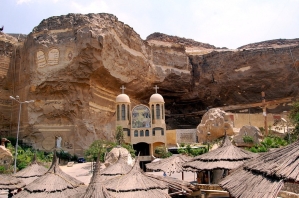A "Cave Church" in Egypt is one of the largest churches in the country, a place where 70,000-plus Christians gather every week to worship and praise Jesus -- a place that's home to one of the world's oldest Christian communities. The cave, also known as the Monastery of Saint Simon, is located in the Mokattam mountain in southeastern Cairo, in an area known as "garbage city" due to the large population of garbage collectors, or Zabbaleen, that live there.
More than 90 percent of the Zabbaleen community members in the Mokattam Village are Coptic Christians. Being in the Arabic world, surrounded by all Islam-dominated countries, it is challenging to maintain the custom and continue their Coptic culture, reports Christians Voice.
Christians Voice reports church communities in Egypt have been declining as the country's residents dealt with political turmoil, a slumping economy and a growing militant insurgency. The exodus of Christians intensified fears for the future for Christianity in the Middle East (Arab World), as some now worry for the fate of Egypt's Christians.
"Mostly they're travelling to the US to find better opportunities because of uncertainties in Egypt," Rev. Markos Ayoub, a priest who leads the Sunday liturgy at St. Mark in English, told Christians Voice. "It's not easy to be a Coptic Christian in the Middle East these days, considering the militant insurgency in Egypt."

The Zabbaleen are descendants of farmers who started migrating from Upper Egypt to Cairo in the 1940s. Fleeing poor harvests and poverty they came to the city looking for work and set-up makeshift settlements around the city. Initially, they stuck to their tradition of raising pigs, goats, chickens and other animals, but eventually found collecting and sorting of waste produced by the city residents more profitable. The Zabbaleen sort through household garbage, salvaging and selling things of value, while the organic waste provides an excellent source of food for their animals. In fact, this arrangement worked so well, that successive waves of migrants came from Upper Egypt to live and work in the newly founded garbage villages of Cairo, reports Amusing Planet.
For years, the makeshift settlements of the Zabbaleen were moved around the city trying to avoid the municipal authorities. Finally, a large group of Zabbaleen settled under the cliffs of the Mokattam or Moquattam quarries at the eastern edge of the city, which now has grown from a population of 8,000 in the early 1980s, into the largest garbage collector community in Cairo, with approximately 30,000 Zabbaleen inhabitants. Christian communities are rare to find in Egypt, so the Zabbaleen prefer to stay in Mokattam within their own religious community even though many of them could afford houses elsewhere.
The local Coptic (Cave) Church in Mokattam Village was established in 1975. After the founding of the church, Amusing Planet reports the Zabbaleen felt more secure in their location and only then began to use more permanent building materials, such as stone and bricks, for their homes. Given their previous experience of eviction from Giza in 1970, the Zabbaleen had lived in temporary tin huts. In 1976, a large fire broke out in Manshiyat Nasir, which led to the beginning of the construction of the first church below the Mokattam mountain on a site of 1,000 square meters. Several more churches have been built into the caves found in Mokattam, of which the Monastery of Saint Simon the Tanner is the largest, with a seating capacity of 20,000; other congregants gathered outside it. In fact, the Cave Church of Saint Simon in Mokattam is the largest church in the Middle East.







